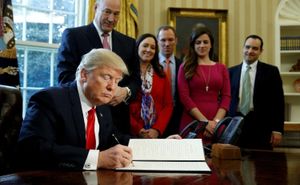Donald Trump, the president-elect, is making some hefty moves as he gears up for his second term, especially when it gets down to innovation and regulation surrounding artificial intelligence (AI) and cryptocurrency. Just recently, he announced the appointment of David Sacks as the White House's AI and Crypto Czar, signifying his commitment to positioning the U.S. as a leader in these cutting-edge fields. This newly created position will see Sacks, the former PayPal executive and founder of Craft Ventures, guiding policy on two significant aspects of American competitiveness.
Since winning back the presidency from Kamala Harris, Trump has been busy lining up key personnel for his administration. Sacks, known for his integral role during the early days of PayPal, is tasked with creating frameworks and strategies to help shape and grow the burgeoning AI and crypto sectors. He has been vocal about the importance of maintaining freedom of speech online, steering away from big tech biases and censorship to allow innovation to flourish.
On his platform Truth Social, Trump shared, "David Sacks will be the White House AI and Crypto Czar, guiding policy …critical to the future of American competitiveness.” The ex-president also mentioned his plans to lead the Presidential Council of Advisors for Science and Technology (PCAST), which offers advice on science, technology, and innovation directly to the presidency.
Continuing with his strategy for regulatory reform, Trump plans to repeal President Biden’s Executive Order concerning AI, signed in October 2023. His administration intends to replace this with policies rooted in free speech and innovation, countering what he calls the current administration's radical left-wing ideas. The original executive order was aimed at safeguarding against potential harms arising from AI, such as discrimination and misinformation.
Alongside Sacks' appointment, Trump nominated Paul Atkins as the new chairman of the Securities and Exchange Commission (SEC). Atkins, who served as SEC commissioner from 2002 to 2008, advocates for regulations fostering innovation and believes digital assets are key for America’s economic growth. Trump's choices reflect his ambitions to make the U.S. the premier destination for cryptocurrency and AI developments.
While Trump advocates for innovation, the regulatory environment remains complex. Various U.S. agencies, including the SEC, are still grappling with how best to regulate the dynamic and often volatile crypto market. The House of Representatives has already passed the Financial Innovation and Technology for the 21st Century Act (FIT21), highlighting the urgency for comprehensive legislation tackling these fast-evolving sectors.
A prominent figure set to make waves is Brian Quintenz, the Head of Policy at Andreessen Horowitz Crypto, who is being considered as the frontrunner for the Commodity Futures Trading Commission (CFTC) chair position under the Trump administration. Quintenz has prior experience as CFTC commissioner and has significantly contributed to implementing the initial Bitcoin and Ethereum futures contracts, bringing much-needed clarity to the digital asset markets.
His candidacy has gained traction due to his relationship with the new administration and the backings from notable investment figures, including Marc Andreessen and Ben Horowitz, co-founders of Andreessen Horowitz. His efforts have been aimed at collaborating closely with Trump's transition team to shape crypto policy and regulation effectively. With Trump’s transition team expected to announce their pick for CFTC chair soon, it will be interesting to observe how these appointments will align with the broader goals of fostering innovation within the U.S.
The fresh appointments signal the Trump administration's focus on bolstering U.S. standing as the global leader for AI and crypto, which may prove pivotal as the global economy navigates technological transformations. Reforming current regulations will be key to supporting innovations and attracting investments within these rapidly growing sectors.
These developments mark significant changes from the previous administration's outlook on money and technology moving forward, potentially setting the stage for new dynamics between government and the tech industry. How successful this approach leads to America asserting itself as the leading market for cryptocurrency and AI will depend largely on the effective combination of regulation, innovation, and the actual implementation of these announced policies.
Overall, as the Trump administration takes shape, the emphasis appears clear. There’s positioning around these two lifelines of modern economics, AI and crypto, not just as topics of interest but as central pillars for America’s strategy to compete globally. With established names like Sacks and Quintenz potentially steering the ship, the upcoming term promises to blend audacious ambitions with pragmatic regulatory frameworks to support the country's technological renaissance.



